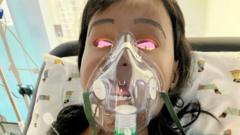Can Talking Dolls Shape the Next Generation of NHS Medics?

Revolutionizing Healthcare Education through Simulation: The SUSIM Experience
In the realm of healthcare education, practical experience remains paramount. Yet, the real-world scenarios that healthcare professionals face can often be daunting and unpredictable. Enter the Swansea University Simulation and Immersive Learning Centre (SUSIM), a state-of-the-art facility designed to bridge the gap between theory and practice for student nurses, doctors, midwives, and paramedics. Through high-tech manikins and a meticulously crafted environment, SUSIM offers a unique and immersive simulation experience that not only equips students with essential skills but also prepares them to handle the complexities of real-life medical situations.
Understanding the Role of Simulation in Healthcare Training
Healthcare professionals must be prepared to respond to a variety of situations, from routine check-ups to life-threatening emergencies. Simulation training allows students to practice their skills in a controlled setting, where they can make mistakes and learn from them without the risk of harming real patients. The SUSIM experience emphasizes the importance of immersion, realism, and interactivity in medical training.
Immersive Learning: A Realistic Environment for Future Healthcare Workers
One of the standout features of SUSIM is its ability to mimic real healthcare environments down to the minutiae. The simulation rooms are equipped with advanced technology that creates an atmosphere reminiscent of actual hospitals, complete with the sounds of machines, ambient noise, and even the smells of an operating theatre. This level of detail is crucial for helping students acclimatize to the sensations they will encounter in their future careers.
- High-Tech Manikins: The center uses sophisticated manikins like Aria, who can simulate a variety of medical conditions and emotional responses, making the training experience authentic.
- Realistic Scenarios: From delivering a baby via C-section to attending to a rugby player injured on the field, simulations cover a wide array of medical situations.
- Environment Control: Technicians can adjust temperature and even replicate outdoor conditions, enhancing the realism of scenarios.
The Advantages of Simulation-Based Training
Simulation-based training at SUSIM offers numerous benefits that traditional training methods may lack. Here are some of the key advantages:
1. Safe Learning Environment
Students can practice their skills without the fear of causing real harm. This safety net encourages experimentation and learning from mistakes, reinforcing the idea that errors are a natural part of the learning process.
2. Enhanced Skill Retention
By engaging multiple senses during training, students are more likely to retain what they learn. The sights, sounds, and smells of a simulation help reinforce knowledge and make it easier to recall in real-life situations.
3. Real-Time Feedback
Instructors can provide immediate feedback during simulations, allowing students to correct mistakes and refine their techniques on the spot. This immediate reinforcement is vital for skill development.
4. Increased Confidence
Students report feeling more confident when transitioning to real-world environments after undergoing simulation training. Familiarity with clinical scenarios reduces anxiety and cognitive overload during actual placements.
5. Collaborative Learning
Simulation training encourages teamwork and communication among students. Working together in realistic scenarios fosters collaboration, which is essential in real healthcare settings.
A Closer Look at the SUSIM Experience
The SUSIM facility is not just about high-tech equipment; it's about creating a comprehensive learning experience that prepares students for the challenges of healthcare. Let's delve deeper into the unique aspects of the training at SUSIM.
Advanced Technology and Equipment
With a budget of £7 million, SUSIM boasts one of the largest installations of immersive wall technology globally, alongside an extensive simulation management system. This technological advancement allows for a wide range of training opportunities, from simple bedside manners to complex surgical procedures.
- Immersive Wall Technology: This technology creates a 360-degree environment, allowing students to feel fully present in the scenario.
- Simulation Management System: Instructors can control and modify scenarios in real-time, tailoring experiences to individual student needs.
Variety of Scenarios
One of the most remarkable features of SUSIM is its versatility. The center can replicate a myriad of healthcare settings, ranging from hospital wards to emergency situations in public spaces like cafes or nightclubs. This adaptability ensures that students are well-prepared for any situation they may encounter in their professional lives.
International Collaboration
In an increasingly globalized world, healthcare professionals may find themselves working in diverse environments. SUSIM has collaborated with healthcare workers from Zambia, showcasing its ability to simulate healthcare settings from around the globe. This international perspective enriches students' training, making it relevant regardless of where they practice.
The Importance of Pre-Briefing and Debriefing
Before each simulation, students participate in a pre-briefing session where they review objectives, roles, and the scenario at hand. This preparation lays the foundation for effective learning and sets expectations. Following the simulation, debriefing sessions allow students to reflect on their experiences, discuss what went well, and identify areas for improvement.
The Concept of “What Happens in SUSIM Stays in SUSIM”
This phrase encapsulates the essence of the SUSIM experience. It emphasizes the importance of creating a safe space for learning, where students can explore, make mistakes, and grow without the fear of judgment. This approach fosters a culture of open communication and continuous improvement.
Conclusion: The Future of Healthcare Training
The SUSIM experience stands as a testament to the evolution of healthcare education. By integrating cutting-edge technology with immersive learning environments, Swansea University is shaping the future of training for healthcare professionals. As students engage in realistic scenarios, they develop the skills, confidence, and resilience needed to excel in their careers.
As healthcare continues to evolve, so too must our methods of training the next generation of practitioners. Simulation training offers a glimpse into the future, where students can learn and grow in an environment that mirrors the challenges they will face in real life. The question remains: how will these innovative training methods transform the landscape of healthcare education in the years to come?
Frequently Asked Questions
What types of scenarios are available for training at SUSIM?
SUSIM offers a diverse range of scenarios, including childbirth, emergency medical situations, and routine hospital care, among others. This variety prepares students for different aspects of healthcare.
How does simulation-based training differ from traditional training methods?
Simulation-based training allows for hands-on practice in a controlled environment, offering immediate feedback and the opportunity to learn from mistakes, unlike traditional lectures or textbook-based learning.
Is SUSIM training suitable for all levels of healthcare students?
Yes, SUSIM is designed to accommodate various levels of experience, providing tailored training scenarios that meet the needs of both novice and advanced students.
As healthcare education continues to embrace innovative methods, the role of simulation centers like SUSIM becomes increasingly vital. How will these advancements shape the future of healthcare training and patient care? #HealthcareEducation #SimulationTraining #FutureOfHealthcare
Published: 2025-06-22 20:51:05 | Category: wales



